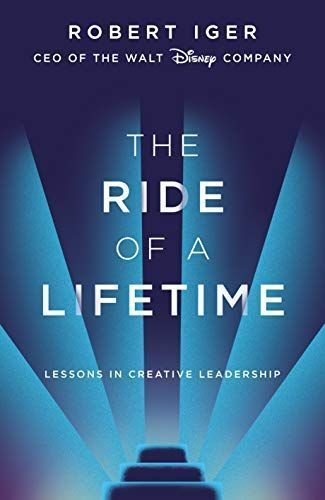
The Ride of a Lifetime Lessons in Creative Leadership from 15 Years as CEO of the Walt Disney Company
THE #1 NEW YORK TIMES BESTSELLER A SUNDAY TIMES BOOK OF THE YEAR 2019 TIME Magazine's Businessperson of the Year 2019 _____________________________ The CEO of Disney, one of Time’s most influential people of 2019, shares the ideas and values he embraced to reinvent one of the most beloved companies in the world and inspire the people who bring the magic to life. Robert Iger became CEO of The Walt Disney Company in 2005, during a difficult time. Morale had deteriorated, competition was intense, and technology was changing faster than at any time in the company’s history. His vision came down to three clear ideas: Recommit to the concept that quality matters, embrace technology instead of fighting it, and think bigger—think global—and turn Disney into a stronger brand in international markets. Fourteen years later, Disney is the largest, most respected media company in the world, counting Pixar, Marvel, Lucasfilm and 21st Century Fox among its properties. Its value is nearly five times what it was when Iger took over, and he is recognized as one of the most innovative and successful CEOs of our era. In The Ride of a Lifetime, Robert Iger shares the lessons he’s learned while running Disney and leading its 200,000 employees, and he explores the principles that are necessary for true leadership, including: Optimism. Even in the face of difficulty, an optimistic leader will find the path toward the best possible outcome and focus on that, rather than give in to pessimism and blaming. Courage. Leaders have to be willing to take risks and place big bets. Fear of failure destroys creativity. Decisiveness. All decisions, no matter how difficult, can be made on a timely basis. Indecisiveness is both wasteful and destructive to morale. Fairness. Treat people decently, with empathy, and be accessible to them. This book is about the relentless curiosity that has driven Iger for forty-five years, since the day he started as the lowliest studio grunt at ABC. It’s also about thoughtfulness and respect, and a decency-over-dollars approach that has become the bedrock of every project and partnership Iger pursues, from a deep friendship with Steve Jobs in his final years to an abiding love of the Star Wars mythology. “The ideas in this book strike me as universal” Iger writes. “Not just to the aspiring CEOs of the world, but to anyone wanting to feel less fearful, more confidently themselves, as they navigate their professional and even personal lives.”
Reviews
Cassandra Tang@tangaroo
Timeo Williams@timeowilliams
Jb@jbr1992
Brooke Lonegan@beetle
Heiki Riesenkampf@hrk
Jeffrey Jose@jeffjose
John Lopiano Jr.@jlopiano44
SA@sajidahakther
Keven Wang@kevenwang
Caash@cassh
Piet Terheyden@piet
linda@lkt
Daniel Bower@danielbower
Ben Burns@benburns
Caroline Lewicki@clewicki20
Kohana@kohana
Hooman Askari@hoomanaskari
John Balek@cruelspirit
Shantesh Patil@shantesh
James Thorburn@colabeard
Nadine Ong@deens
Cristian Garcia@cristian
Beecher Halladay@beecher
Tyler Stober@tyler
Highlights
Cassandra Tang@tangaroo
Cassandra Tang@tangaroo
Cassandra Tang@tangaroo
Cassandra Tang@tangaroo
Cassandra Tang@tangaroo
Cassandra Tang@tangaroo
Piet Terheyden@piet
Piet Terheyden@piet
Piet Terheyden@piet
Piet Terheyden@piet
Piet Terheyden@piet
Piet Terheyden@piet
Piet Terheyden@piet